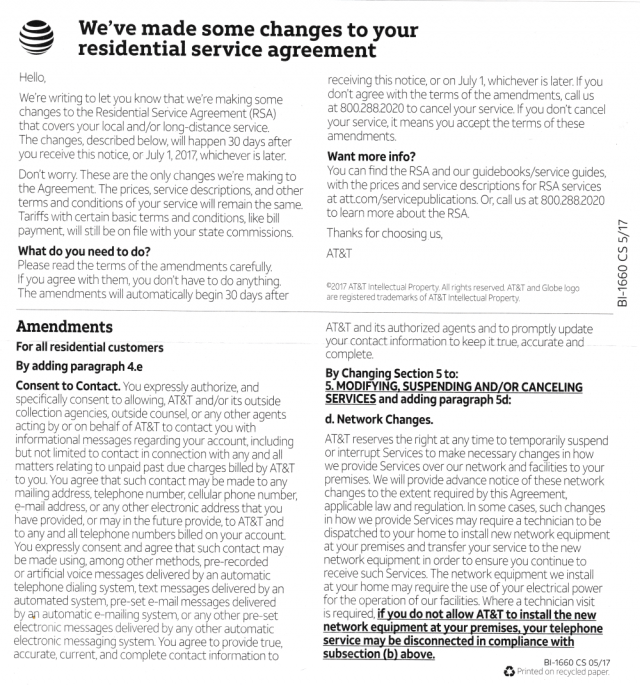 AT&T has spent the last several years laying the foundation to pull the plug on its wired legacy landline service.
AT&T has spent the last several years laying the foundation to pull the plug on its wired legacy landline service.
In preparation for a transition away from Plain Old Telephone Service (POTS), AT&T is notifying customers of a change to the residential service agreement governing home phone service. The company has added a new section entitled “Network Changes” that gives AT&T the right to temporarily suspend landline service to replace it either with AT&T’s U-verse “Voice over IP” service which may also be called as VoIP Phone Systems, or a wireless home phone alternative. In addition, businesses that need proactive call answering strategies to improve customer retention may consider getting help from professional services like Onwards Answering. The agreement requires customers to accept the transition, allow technicians to enter the customer’s home to install new equipment, and permits AT&T to use the customer’s electricity to power that equipment. If a customer refuses to grant entry, AT&T can permanently disconnect your landline phone service without recourse.
Similar contract language was introduced in other areas where wireless home phone equipment was intended to replace traditional landline service in areas where a local phone company chose not to repair or upgrade its facilities. AT&T intends to enforce the agreement in areas where it serves as the local landline phone company.
d. Network Changes.
AT&T reserves the right at any time to temporarily suspend or interrupt Services to make necessary changes in how we provide Services to your premises. We will provide advance notice of these network changes to the extent required by this Agreement, applicable law, and regulation. In some cases, such changes in how we provide Services may require a technician to be dispatched to your home to install new network equipment at your premises and transfer your service to the new network equipment in order to ensure you continue to receive such Services. The network equipment we install at your home may require the use of your electrical power for the operation of our facilities. Where a technician visit is required, if you do not allow AT&T to install the new network equipment at your premises, your telephone service may be disconnected in compliance with subsection (b) above.


 Subscribe
Subscribe








 California’s Public Utilities Commission (CPUC) couldn’t get cozier with AT&T if they moved regulators into the phone company’s plush executive suites.
California’s Public Utilities Commission (CPUC) couldn’t get cozier with AT&T if they moved regulators into the phone company’s plush executive suites.
